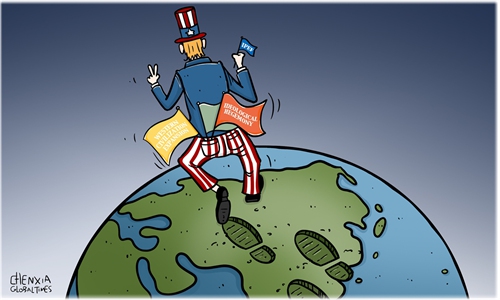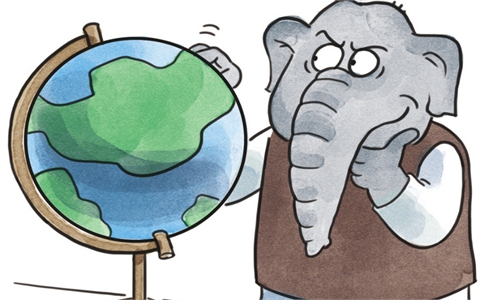China’s security concept prescribes a sense of pragmatism needed in Asia and beyond

Illustration: Chen Xia/GT
Editor's Note:
The annual IISS Shangri-La Dialogue gets underway on Friday. Pressing security concerns will be touched upon, yet most of the attention is on China-US ties, and the two's different security layout. What's the biggest difference between the security visions of China and the US? Anna Malindog-Uy (Malindog-Uy), a senior research fellow of the Global Governance Institution, and vice president of External Affairs of the Asian Century Philippines Strategic Studies Institute, shared her views with Global Times (GT) reporter Li Aixin.
GT: What do you expect the most from this year's Shangri-La Dialogue?
Malindog-Uy: Given the volatile and tension-driven world order at the moment, what I expect most from this year's event is that the discourse of this security conference will center on the tensions and conflicts happening in various parts of the world.
GT: How do you view China's Global Security Initiative (GSI) and China's vision to address the global security dilemma? How does it differ from the Western concept?
Malindog-Uy: The GSI is an alternative security framework and approach toward conflict resolution and peace promotion across the globe that to a greater extent challenges the Western-led or the American-led global security governance framework for conflict resolution and peace promotion, which most often than not has been operationalized on the pretext of US unilateralism.
As far as I am concerned, the GSI should be interpreted and understood as China's commitment to upholding multilateralism and its peaceful rise as a global economic powerhouse and as a great power, both politically and militarily.
I also see the GSI as the Chinese way of promoting "Asian cooperation and unity as one family," cooperatively addressing intertwined and interconnected traditional and non-traditional security issues and concerns that Asia as a region is facing.
Likewise, the GSI should be understood as China's firm pursuit and commitment in upholding the basic norms governing international relations and safeguarding global fairness, justice, and peace. It also serves to a greater extent China's assurance to the world, particularly countries in Asia, that it would never seek hegemony or engage in expansionism or unilateralism and that China stands firm against all forms of hegemonism, unilateralism and power politics and opposes the Cold War mentality, interference in other countries internal affairs, and double standards, showcasing that China as a major power in the world is a responsible member of the international community.
In many ways, the GSI should be seen as China's commitment to building a peaceful and harmonious world alongside China's pledge to build humanity with a shared future.
GT: What role do you think China's vision could play in the region?
Malindog-Uy: China's security initiative has touched the heart of Indo-Pacific countries precisely because it is an Asian way of resolving conflicts of interest and differences between and among nations, moving away from a Western-oriented direct confrontational-megaphone diplomacy. It puts a premium on the preservation of harmony at all costs, and makes sure that discords are kept low-key and as much as possible at the minimum, and exchanges between parties are cordial and pleasant filled with pragmatism and lots of patience, creativity, and goodwill. Furthermore, to promote peace and security the Asian way would mean shifting the mind-set from a "winner-takes-all" mentality and attitude toward a more collective outlook.
Furthermore, China's security initiative embodied in the GSI is a pragmatic and realistic approach to maintaining peace and security in the Asian region and across the globe. It prescribes a sense of pragmatism needed and the necessary principles through which peace, security, and development could be achieved and secured in the wider Asian region and beyond. It also provides a new approach to addressing the root causes of global conflicts, both intra-state and inter-state conflicts, and solving security challenges facing humanity through multilateralism and inter-state cooperation more holistically and realistically without compromising countries' territorial integrity and sovereignty.
GT: What's your take on "US leadership" in the Indo-Pacific region as the theme of US Defense Secretary Lloyd Austin's speech, to be delivered on Saturday?
Malindog-Uy: This so-called US leadership in the Indo-Pacific region embodied in the US Indo-Pacific Strategy has lost some political currency for some time now precisely because many, if not all, ASEAN countries are concerned and suspicious that the strategy is nothing more than a narrower, security-centric effort of the US alongside Japan, Australia, and India to counter China. Because of this lingering suspicion, the strategy has found relatively little support in some Southeast Asian capitals and has fewer takers in the region because it risks fomenting divisions among ASEAN countries, jeopardizes ASEAN centrality, and makes Southeast Asia as the geopolitical battleground of the Indo-Pacific Strategy.
Many, if not all, ASEAN countries refuse and try to avoid taking a side between the US and China and would instead uphold ASEAN's centrality and seek a balance between the two countries' strategic alignments and economic interests. In essence, most ASEAN countries, if not all, prefer not to choose between the US and China and may not side with the US if forced to pick. Thus, this poses a problem to the US Indo-Pacific Strategy and this so-called US leadership in the Indo-Pacific region, which makes it look weak and vulnerable.
This so-called US leadership in the Indo-Pacific region has lost integrity and credibility precisely because Asians know that the pivot to Asia strategy of the US is a foreign policy with the ultimate goal of only promoting US interests by shaping the norms and rules of the Asia-Pacific region and to contain Chin's peaceful rise. Asians know that this so-called US leadership in the Indo-Pacific region is primarily to safeguard and secure US survival as the global hegemon and dominant power in a unipolar international system continuously being challenged by the rise and the continuously growing influence of China alongside the strengthening economic and military power of other contending regional powers like Russia, and many Asians if not all don't buy the motive behind this US leadership in the region.



